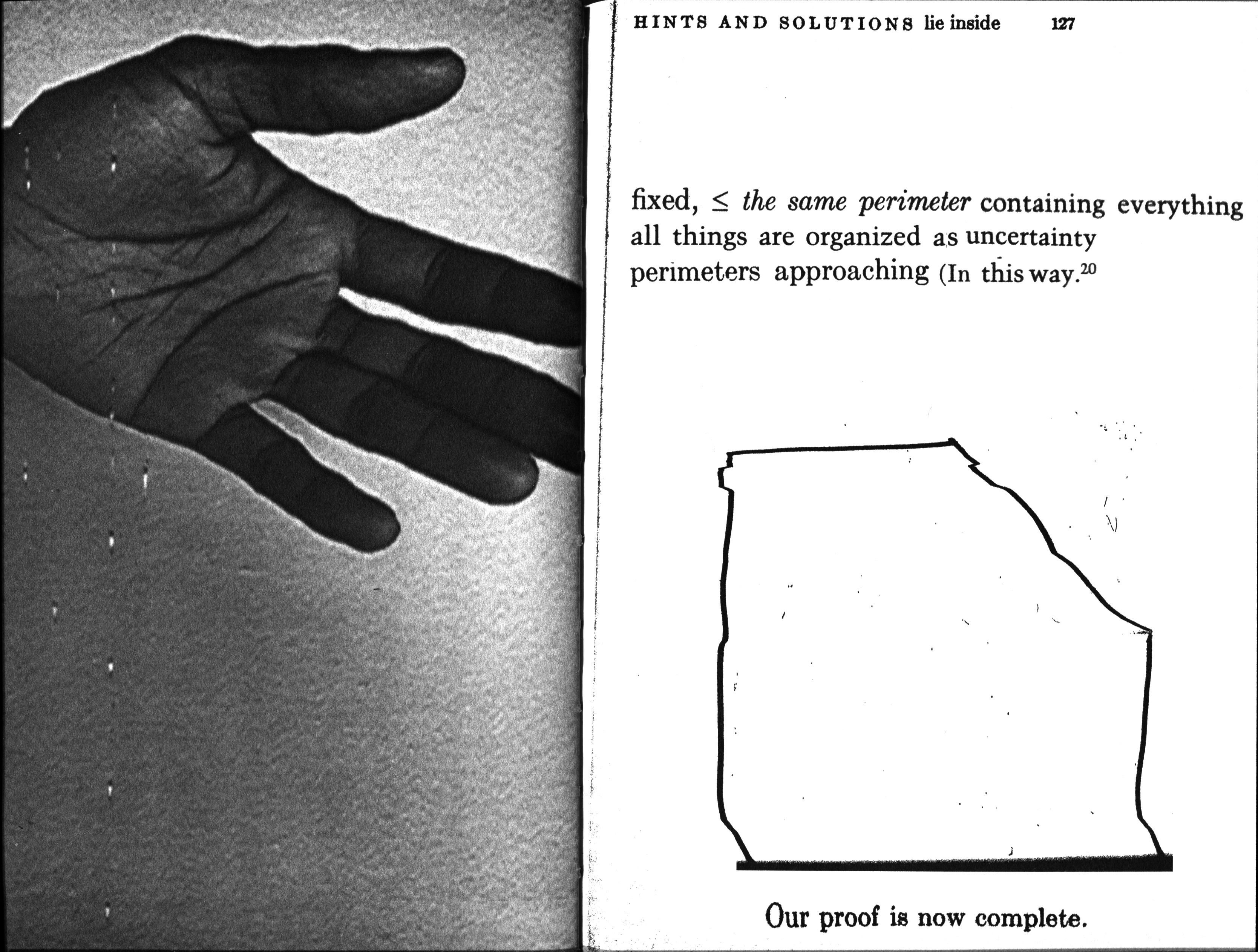Title
No New Theories
Year
2019
Publisher
Printed Matter, Inc.
Publisher Location
New York, NY
Pages
256 pp.
Dimensions
9” x 6”
Cover
Paperback; high gloss silkscreen cover
Binding
Sewn Bound; otabound
Process
Offset Printed, Screen Print
edge-printing
suede-ink bookmark
edge-printing
suede-ink bookmark
Color
Black-and-White
Edition Size
1000
Purchase/View
More Information
No New Theories builds on Kameelah Janan Rasheed’s accretive and associative installation work, bringing together xerox abstractions, poetic text fragments, and found as well as original photography to explore learning and unlearning as a spiritual, socio-political, ecological, and cognitive process.
With No New Theories Rasheed freely assembles her own writing, autocorrect algorithms, and Oulipian poems (short texts generated with the help of imposed constraints) alongside visuals drawn from her personal image archive, pop culture, zoological journals, quranic verses, and other sources. The work gathers these threads with an emphasis on the processes of revision and improvisation as she considers the entropic potential of meaning in place of fixed definitions.
At the heart of No New Theories is an expansive interview between Rasheed and Jessica Lynne, co-founder of the art criticism journal ARTS.BLACK. The conversation attempts to document their intellectual partnership, constructed through a layering process by which the original exchange is reworked and expanded with annotations, citations, and excerpted texts from writers Samuel R. Delany, Alexis Pauline Gumbs, Emily Dickinson, and others.
Rasheed and Lynne take on questions of epistemology and pedagogy, the nature of research, knowledge-acquisition, as well as patience and fatigue. Building on the notion of the ‘organic archive’ — both as a fictional organizing framework and as a score for possible experiences — the two consider various historical, sociological, and cultural facets of Americana, proposing a multi-directional discourse around the wide permutations of Black experience. The book’s title — No New Theories — locates Blackness as a multivalent and porous experience that cannot and should not be neatly theorized.
With No New Theories Rasheed freely assembles her own writing, autocorrect algorithms, and Oulipian poems (short texts generated with the help of imposed constraints) alongside visuals drawn from her personal image archive, pop culture, zoological journals, quranic verses, and other sources. The work gathers these threads with an emphasis on the processes of revision and improvisation as she considers the entropic potential of meaning in place of fixed definitions.
At the heart of No New Theories is an expansive interview between Rasheed and Jessica Lynne, co-founder of the art criticism journal ARTS.BLACK. The conversation attempts to document their intellectual partnership, constructed through a layering process by which the original exchange is reworked and expanded with annotations, citations, and excerpted texts from writers Samuel R. Delany, Alexis Pauline Gumbs, Emily Dickinson, and others.
Rasheed and Lynne take on questions of epistemology and pedagogy, the nature of research, knowledge-acquisition, as well as patience and fatigue. Building on the notion of the ‘organic archive’ — both as a fictional organizing framework and as a score for possible experiences — the two consider various historical, sociological, and cultural facets of Americana, proposing a multi-directional discourse around the wide permutations of Black experience. The book’s title — No New Theories — locates Blackness as a multivalent and porous experience that cannot and should not be neatly theorized.















